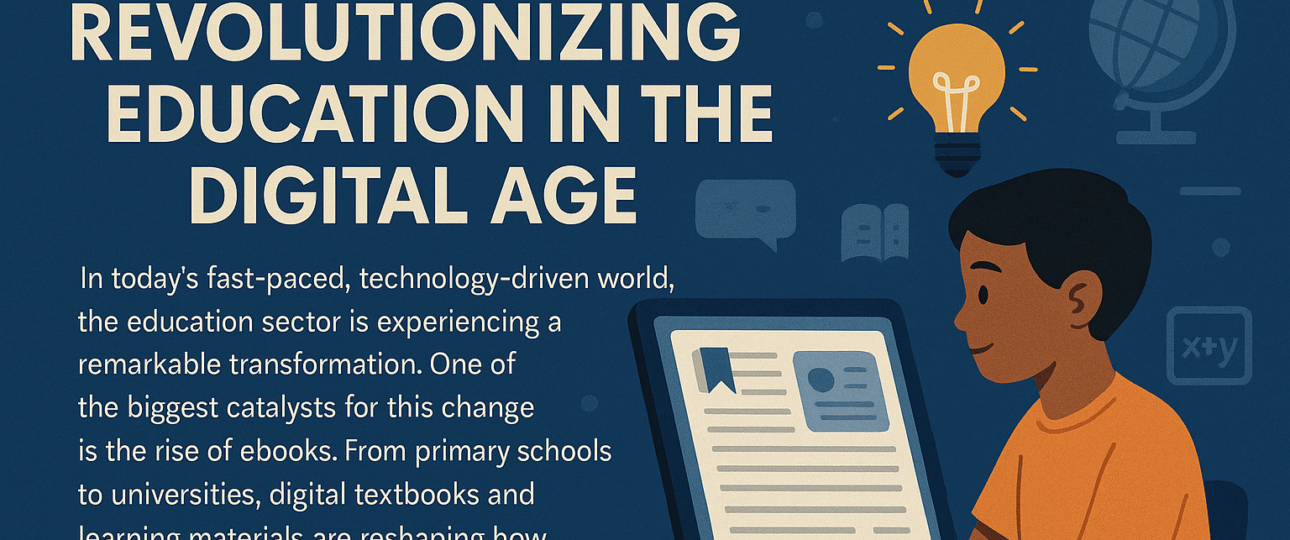Why Ebooks Are Revolutionizing Education in the Digital Age
In today’s fast-paced, technology-driven world, the education sector is experiencing a remarkable transformation. One of the biggest catalysts for this change is the rise of ebooks. From primary schools to universities, digital textbooks and learning materials are reshaping how knowledge is delivered and consumed. Why ebooks are revolutionizing education is a question at the heart of this shift—and the answers are as exciting as they are impactful.
In this article, we’ll explore the many ways ebooks are changing the face of education, their benefits, and why their influence will only grow stronger in the coming years.
The Digital Shift: A New Era of Learning
Gone are the days when students carried heavy backpacks filled with textbooks. With the advent of tablets, e-readers, and smartphones, ebooks have made learning more accessible, convenient, and engaging.
One of the primary reasons why ebooks are revolutionizing education is their ability to align perfectly with the needs of a digital-first generation. Today’s students are digital natives who naturally gravitate toward technology. Ebooks fit seamlessly into their learning habits, offering interactive features that traditional print books simply cannot provide.
Key Reasons Why Ebooks Are Revolutionizing Education
1. Accessibility Anytime, Anywhere
Ebooks break down barriers to education. With an internet connection, students can access educational materials from anywhere in the world. Whether it’s a small village or a bustling city, ebooks ensure that learning opportunities are no longer confined to the four walls of a classroom.
Students can easily download textbooks, research papers, and supplementary materials onto their devices, enabling learning on the go. This flexibility is particularly valuable for distance learners and those in remote areas.
2. Cost-Effectiveness
Traditional textbooks are notoriously expensive. The costs can add up quickly, placing a significant financial burden on students and their families. Ebooks offer a cost-effective alternative. They are often cheaper to produce and purchase, and many open educational resources (OER) are available completely free of charge.
By reducing the costs of educational materials, ebooks are making education more inclusive and affordable for students worldwide.
3. Interactive and Engaging Content
One of the most exciting aspects of why ebooks are revolutionizing education is their ability to provide dynamic, interactive content. Ebooks can include:
- Embedded videos and audio clips
- Hyperlinks to additional resources
- Interactive quizzes and assessments
- 3D models and virtual simulations
These features help to cater to different learning styles—whether visual, auditory, or kinesthetic—making education a richer and more personalized experience.
4. Environmentally Friendly
The environmental benefits of ebooks cannot be ignored. Traditional book publishing consumes massive amounts of paper, contributing to deforestation and environmental degradation.
By contrast, ebooks are eco-friendly, helping to reduce the carbon footprint of education. Schools, colleges, and universities that adopt digital textbooks contribute to sustainability efforts while meeting the learning needs of their students.
5. Instant Updates and Revisions
Textbooks quickly become outdated as new discoveries are made and new information emerges. Updating printed textbooks is costly and slow.
Ebooks, however, can be updated instantly. Authors and publishers can correct errors, add new information, and enhance content with ease. This ensures that students always have access to the latest and most accurate information.
How Ebooks Enhance Different Levels of Education
Primary and Secondary Education
At the school level, ebooks are being integrated into curriculums to enhance early learning. Interactive stories, educational games, and animated lessons make learning fun and effective for young minds. Moreover, ebooks help teachers create a more inclusive classroom where students of different abilities and learning styles can thrive.
Higher Education
Colleges and universities are increasingly adopting e-books for course materials. Digital libraries, research databases, and academic ebooks allow students to conduct research more efficiently. Moreover, ebooks facilitate a flipped classroom model, where students engage with course content at home and participate in discussions and activities in the classroom.
Lifelong Learning
Ebooks have also revolutionized lifelong learning. Professionals seeking to upgrade their skills or pivot careers can access a vast range of online courses and ebooks. The flexibility and accessibility of ebooks make continuous education more attainable for adults balancing work and personal commitments.
Addressing Common Concerns About Ebooks
Despite the many advantages, some concerns remain regarding e-books in education.
1. Screen Fatigue
Extended screen time can lead to eye strain and fatigue. However, technological advancements like blue light filters, e-ink displays, and adjustable screen settings are helping to mitigate these issues.
2. Digital Divide
Access to devices and the internet is still a challenge in some regions. Governments and educational institutions are working on initiatives to provide digital devices and affordable internet access to bridge this gap.
3. Learning Preferences
Some learners still prefer the tactile experience of printed books. Hybrid models that combine digital and print resources are becoming popular, offering the best of both worlds.
The Future of Education: A Digital Landscape
Looking ahead, it’s clear that ebooks will play an even larger role in shaping the future of education. As technology continues to evolve—with augmented reality (AR), virtual reality (VR), and artificial intelligence (AI) entering the educational scene—ebooks will likely integrate these advancements to create even more immersive learning experiences.
Personalized learning, adaptive assessments, and AI-driven tutoring are no longer distant dreams but are quickly becoming realities. Ebooks, with their digital nature, are at the forefront of these innovations.
Final Thoughts: Embracing the Revolution
Understanding why ebooks are revolutionizing education is key to embracing the future of learning. Ebooks offer accessibility, affordability, interactivity, and sustainability—all essential factors for modern education systems.
While challenges remain, the benefits far outweigh the drawbacks. By leveraging ebooks and integrating them thoughtfully into curriculums, educators can create more dynamic, inclusive, and effective learning environments.
In the digital age, ebooks are not just an alternative to printed textbooks—they are the gateway to a brighter, more connected educational future.


3 Comments
[…] Read More Why Ebooks Are Revolutionizing Education […]
[…] Read More Why Ebooks Are Revolutionizing Education […]
[…] Read More Why Ebooks Are Revolutionizing Education […]